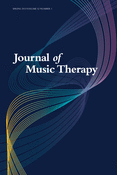-
Views
-
Cite
Cite
Noah Potvin, Joke Bradt, Amy Kesslick, Expanding Perspective on Music Therapy for Symptom Management in Cancer Care, Journal of Music Therapy, Volume 52, Issue 1, Spring 2015, Pages 135–167, https://doi.org/10.1093/jmt/thu056
Close - Share Icon Share
Abstract
Symptom management is a frequently researched treatment topic in music therapy and cancer care. Representations in the literature of music interventions for symptom management, however, have often overlooked the human experiences shaping those symptoms. This may result in music therapy being perceived as a linear intervention process that does not take into account underlying experiences that contribute to symptom experiences.
This study explored patient experiences underlying symptoms and symptom management in cancer care, and examined the role of music therapy in that clinical process.
This study analyzed semi-structured, open-ended exit interviews obtained from 30 participants during a randomized controlled trial investigating the differential impact of music therapy versus music medicine interventions on symptom management in participants with cancer. Interviews were conducted by a research assistant not involved with the clinical interventions. Exit interview transcripts for 30 participants were analyzed using an inductive, latent, constructivist method of thematic analysis.
Three themes—Relaxation, Therapeutic relationship, and Intrapersonal relating—capture elements of the music therapy process that (a) modified participants’ experiences of adjustments in their symptoms and (b) highlighted the depth of human experience shaping their symptoms. These underlying human experiences naturally emerged in the therapeutic setting, requiring the music therapist’s clinical expertise for appropriate support.
Symptom management extends beyond fluctuation in levels and intensity of a surface-level symptom to incorporate deeper lived experiences. The authors provide recommendations for clinical work, entry-level training as related to symptom management, implications for evidence-based practice in music therapy, and methodology for future mixed methods research.




